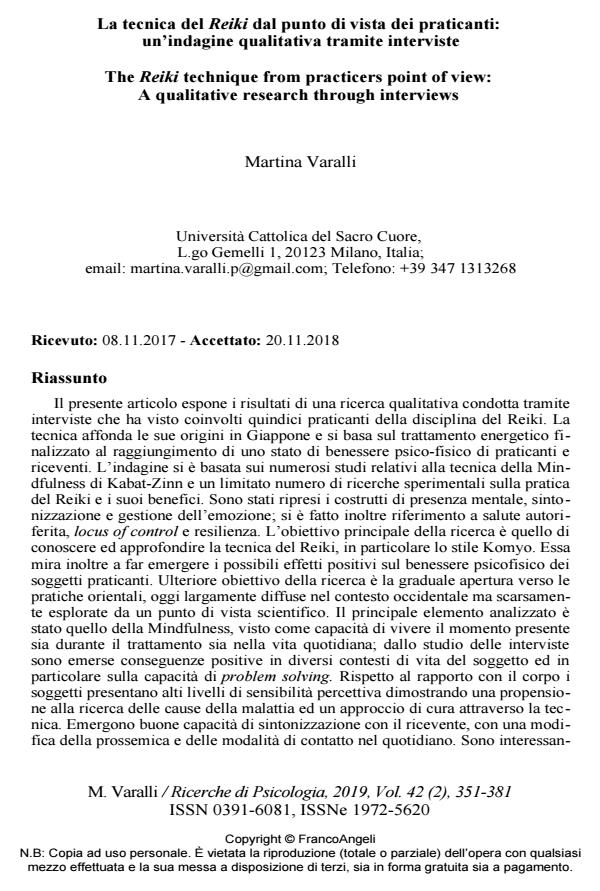The Reiki technique from practicers point of view: A qualitative research through interviews
Journal title RICERCHE DI PSICOLOGIA
Author/s Martina Varalli
Publishing Year 2019 Issue 2019/2
Language Italian Pages 30 P. 351-380 File size 273 KB
DOI 10.3280/RIP2019-002007
DOI is like a bar code for intellectual property: to have more infomation
click here
Below, you can see the article first page
If you want to buy this article in PDF format, you can do it, following the instructions to buy download credits

FrancoAngeli is member of Publishers International Linking Association, Inc (PILA), a not-for-profit association which run the CrossRef service enabling links to and from online scholarly content.
The article presents the results of a qualitative research conducted through interviews involving fifteen Reiki practicers. This technique was born in Japan and it is based on an energy treatment finalized to achieve a state of psychophysical wellbeing of practicers and receivers. Interviews’ analysis has allowed us to highlight the potentialities of this new practice and verify its positive effects on subjects’ lifestyle. The survey was based on numerous studies about Kabat-Zinn’s Mindfulness technique and a limited number of experimental research about Reiki practice and its benefits. We considered constructs of mental presence, tuning and emotions management; we also referred to self-reported health, locus of control and resilience. The main goal of the research is to know and study in deep Reiki technique, Komyo style in particular. It also aims to bring out possible positive effects on psychophysical wellbeing of practicing subjects. Further goal is a gradual opening to oriental practices, today widely diffuse but poorly explored from the scientific point of view. The principal element analyzed was Mindfulness that can be seen as the ability to live the present moment both during treatment and in everyday life, with positive consequences on different contexts of the subject’s life and particularly on problem solving skills. The relationship with the body has been analyzed: subjects present high level of perceptual sensibility and show a propensity to search for causes of diseases and an approach of care using the technique. Good tuning capabilities emerge, with a modification of the proxemics and of the contact mode in everyday life. Interesting results has been found about emotional intelligence which is bound to self-awareness and functional emotional regulation strategies. Finally, the ability to accept negative events, which refers to the concepts of resilience and locus of control, has been analyzed. In general the research has allowed to highlight positive effects of Reiki on psychological and emotional wellbeing of the pattern, in its practical and theoretical components.
Keywords: Wellbeing, psycho-physical, Reiki, Mindfulness, lifestyle
Martina Varalli, La tecnica del Reiki dal punto di vista dei praticanti: un’indagine qualitativa tramite interviste in "RICERCHE DI PSICOLOGIA " 2/2019, pp 351-380, DOI: 10.3280/RIP2019-002007